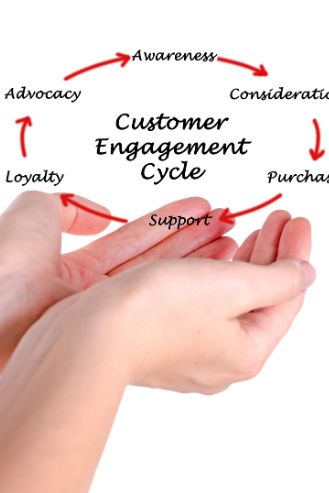
Achieving True Connection: AI for Personalization at Scale in Customer Engagement
In today’s hyper-connected world, leveraging AI for Personalization at Scale has become the cornerstone of effective customer engagement strategies, enabling businesses to forge deeper, more meaningful connections with their audiences. Customers no longer tolerate generic, one-size-fits-all messaging; they expect brands to understand their individual needs, preferences, and context. Delivering this level of personalization manually across thousands or millions of customers is simply impossible. Artificial Intelligence (AI) provides the crucial capability to analyze vast amounts of customer data, identify intricate patterns, predict future behavior, and automate the delivery of tailored experiences across every touchpoint, transforming engagement from transactional to relational.

The Personalization Imperative vs. The Scale Challenge
The demand for personalization is undeniable. Studies consistently show that consumers are more likely to engage with and purchase from brands that offer relevant, personalized experiences. They value feeling understood and appreciated. However, the sheer scale of modern digital audiences presents a significant challenge. Manually segmenting audiences, crafting unique messages for each segment (let alone individual), and orchestrating delivery across multiple channels requires immense resources and time, often rendering true 1:1 personalization impractical. This is where AI steps in as the great enabler. Technologies like machine learning and, increasingly, generative AI are pivotal in crafting these customer experiences, bridging the gap between customer expectations for relevance and the operational realities of managing large-scale engagement efforts.
How AI Powers Personalization at Scale
AI achieves personalization at scale through several core capabilities:
- Massive Data Analysis: AI algorithms can process and analyze enormous volumes of structured and unstructured customer data (clicks, purchases, browsing history, demographics, social interactions, support tickets, reviews) far beyond human capacity.
- Pattern Recognition: Machine learning models identify subtle patterns, correlations, and micro-segments within the data that reveal customer preferences, intent signals, and behavioral trends.
- Predictive Capabilities: AI can forecast future customer actions, such as likelihood to purchase, churn risk, or interest in specific product categories, enabling proactive personalization.
- Natural Language Processing (NLP): NLP allows AI to understand and interpret human language from sources like emails, chat logs, and reviews, gauging sentiment and extracting key information for personalization.
- Automation: AI automates the execution of personalized actions, such as triggering specific email sequences, displaying dynamic website content, recommending relevant products, or powering chatbot responses.
- Generative AI (GenAI): Newer GenAI models can assist in creating personalized content variations (email copy, ad headlines, product descriptions) tailored to different segments or individuals efficiently.
Key Applications: Where AI Delivers Personalized Engagement
The application of AI for personalization spans the entire customer lifecycle. The foundation for many of these applications lies in harnessing the insights derived from the transformative role of big data in modern marketing, which AI algorithms process to drive personalization.
1. Dynamic Website & App Personalization
AI analyzes a visitor’s real-time behavior (pages viewed, time spent, referral source) combined with historical data (past purchases, demographics) to dynamically alter website content, layout, offers, and calls-to-action for each individual user, creating a unique and relevant browsing experience.
2. Hyper-Personalized Email Marketing
Moving beyond simple name tokenization, AI enables emails with personalized subject lines, content blocks, product recommendations, and send times optimized for individual engagement patterns. It powers automated trigger campaigns based on specific user actions or predicted needs.
3. Intelligent Product & Content Recommendations
AI algorithms (like collaborative filtering or content-based filtering) analyze user behavior and preferences to suggest products, articles, videos, or music they are most likely to be interested in, significantly boosting engagement and conversion rates (think Netflix or Amazon).
4. AI-Powered Chatbots & Customer Support
AI chatbots use NLP to understand customer queries and provide instant, personalized responses 24/7. They can access customer history to provide context-aware support, resolve common issues, guide users, and even escalate complex problems to human agents seamlessly, providing relevant context.
5. Predictive Targeting in Advertising
AI analyzes data to predict which audience segments or individuals are most likely to respond to specific ad campaigns or offers. This enables highly targeted advertising spend, improving relevance, reducing waste, and increasing return on ad spend (ROAS).
6. Personalized Customer Journeys
AI can map individual customer journeys and trigger personalized interactions across multiple channels (email, SMS, push notification, web) based on the customer’s current stage, behavior, and predicted next steps, ensuring a cohesive and relevant experience.
7. Proactive Churn Prevention
By analyzing engagement patterns and other signals, AI can predict which customers are at risk of churning. This allows businesses to proactively reach out with personalized retention offers, targeted support, or feedback requests before the customer leaves.
Implementing AI for Personalization: A Practical Approach
Successfully deploying AI for personalization requires a strategic roadmap:
- Build a Solid Data Foundation: Ensure you have access to clean, accurate, integrated customer data. Invest in data quality processes and potentially a Customer Data Platform (CDP) to unify data sources.
- Define Clear Personalization Goals: What specific engagement metrics or business outcomes are you trying to improve (e.g., conversion rate, CLV, engagement time, churn rate)?
- Select Appropriate AI Tools/Platforms: Choose solutions that match your goals, budget, technical expertise, and integration needs. Many marketing automation platforms, CRMs, and specialized AI vendors offer relevant capabilities.
- Start Small and Iterate: Begin with a pilot project focused on a specific channel or customer segment (e.g., personalizing email recommendations for repeat purchasers). Measure results, learn, and gradually expand.
- Prioritize Ethical Considerations: Be transparent about data usage. Ensure compliance with privacy regulations (GDPR, CCPA). Actively monitor AI models for potential bias and mitigate it. Focus on providing genuine value, not just manipulation.
- Integrate Seamlessly: Ensure your AI tools integrate smoothly with your existing marketing stack (CRM, email platform, website CMS) for efficient data flow and execution.
- Empower Your Team: Provide training on using AI tools and interpreting data insights. Foster a culture that embraces data-driven personalization and experimentation.
Navigating the Challenges
While powerful, implementing AI for personalization involves challenges:
- Data Privacy & Ethics: Balancing personalization with user privacy is crucial and requires careful governance.
- Data Quality & Integration: Garbage in, garbage out. Poor data leads to poor personalization. Integrating siloed data is often complex.
- Cost & Complexity: Advanced AI tools and the expertise required to manage them can be expensive and complex.
- Potential for Bias: AI models can inadvertently learn and perpetuate biases present in the training data if not carefully managed.
- The “Creepiness” Factor: Overly intrusive or inaccurate personalization can backfire and alienate customers. Finding the right balance is key.
“The future of customer engagement isn’t just personalized; it’s personal, predictive, and powered by intelligence.” – AI Marketing Expert
Conclusion: Building Relationships, One Personalized Interaction at a Time
AI for Personalization at Scale is fundamentally reshaping customer engagement, moving brands beyond generic broadcasting towards meaningful, individual conversations. By harnessing the power of AI to understand customer data, predict needs, and automate tailored interactions across channels, businesses can create experiences that are not only relevant but also genuinely valuable to the customer. This fosters deeper engagement, builds lasting loyalty, improves conversion rates, and ultimately drives significant business growth. While implementation requires strategic planning, investment, and a commitment to ethical practices, the ability to connect with customers on a truly personal level, even across diverse advertising formats like pop advertising when used contextually, makes AI-driven personalization an essential capability for any forward-thinking organization in 2025 and beyond.


